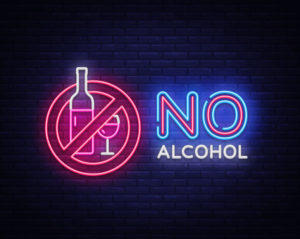Why to Try a Dry January
- By Elisabeth Flynn
- Reading Time: 4 mins.
More and more people are observing “Dry January;” an annual abstinence ritual of taking a break from all the alcohol many of us imbibed during the boozy excesses of December holiday parties.

Reported benefits include weight loss, better sleep, improved focus and clarity, and more money in the bank. “The benefits are astounding,” Dr. Richard Piper, CEO of Alcohol Change UK, the British organization that sparked the movement in 2013. told British Good Housekeeping. “49% of people lose weight, while 62% sleep better, and a whopping 79% save money.”
What’s more, research shows that 72% of those who participate in Dry January maintain lower levels of harmful drinking six months later.
Jumping On The Wagon
Four million Brits, and one in five Americans, reported that they planned to participate in Dry January in 2019. And it doesn’t have to start January 1. Any day is a good day to start a 31-day sober-curious journey.
Philadelphia-based food writer Joy Manning, editor of Edible Philly magazine and co-host of the Local Mouthful podcast, decided to give Dry January a try in 2017, and has since become a passionate advocate for the practice.
Manning struggled for years with “the role alcohol played in my life,” she told The FruitGuys Magazine. Working in an environment that revolves around food and drink, even as a moderate drinker, she recognized harmful impacts that alcohol had on her physical and mental well-being. After her first Dry January, she realized that she simply felt better when she wasn’t drinking.
She now describes herself as “an enthusiastic nondrinker” and writes about living an alcohol-free life in her blog Better Without Booze.
The FruitGuys Magazine asked Manning what made the experience so transformative for her—and what she recommends for people who are considering going dry for a month.
“I was shocked that I started losing weight almost immediately and have been able to maintain a healthy body weight without trying for more than two years,” Manning says. “A thing I thought was impossible for me.” Once she stopped drinking, she noticed that her skin looked dramatically better as well.
Perhaps the biggest surprise of all was that she didn’t miss alcohol at all. “I’m surprisingly glad to be rid of it,” Manning says.
Her advice to those who are sober curious and considering a Dry January? “If you are even toying with the idea—do it!”
Navigating Dry Life
If your social routine is heavily alcohol-focused, Manning recommends being proactive and planning activities that will keep you entertained and not feeling deprived.
Mocktail Recipes to Try This Season
Celebrate and stay clear-headed with a tasty mocktail.“Don’t suffer through it by staying at home, avoiding dinners out, happy hours, and parties,” Manning says. “You think those things are no fun without alcohol only because you’ve wired your brain to associate the two over the years.”
She says it takes time for your brain to get used to a different set of rewards.
“Doing those things without a drink will start to rewire [your brain],” she explains, while noting that more than a month is required to fully change your programming.
It can help to get others in your social circle involved, even if they’re not fully participating in a dry month. “Take the lead by planning fun things that don’t involve alcohol,” Manning says. “I’ve invited friends to visit a trampoline park, take indoor cycling classes, and learn how to make vegan cheese in a cooking class during Dry Januaries past. It can be fun to get out of the rut.”
Saying No in Professional Settings
When it comes to work-related situations that may involve alcohol, such as an office party or a networking happy hour, Manning stresses that it’s not a big deal to politely decline. “’No thank you’ is really all you need to say,” she notes. “If I want to make a point about it, I ask if there are any nonalcoholic options.”
You don’t owe your colleagues any explanation of your choice not to drink, whether it’s for one night, one month, or a longer commitment, Manning says, adding, “Most people never make an issue of it. And if someone does, a simple ‘I don’t feel like it’ or ‘I’m not drinking alcohol tonight’ should shut it down.”
If you have to attend a conference or large business event where alcohol-fueled socializing is prevalent, she has some tips on her blog about how to get through it sober:
- Make an active decision not to drink
- Make a list of all the positive results of avoiding alcohol
- Get a drink—a non-alcoholic one—in your hand right away
- Find a non-drinking buddy (ask around, there may be more than you think)
Conclusion
The benefits of a Dry January may be as simple as losing some weight and discovering a new way to experience socializing. As the research suggests, it can also lead you to healthier habits in the long term.
In Manning’s case, the shift away from alcohol gave her a whole new outlook on life, particularly on the “shared cultural illusion” that the alcohol industry has perpetuated for years.
“The marketing and brainwashing is so pervasive that most of us give alcohol the credit for making us confident, fun, romantic, wild, and worldly,” she says, when in fact “all those things we give it credit for, I actually experienced more deeply, more vividly, more authentically without it.”
Additional Resources:
- Sober Curious podcast – from author Ruby Warrington
- Recovering – the newsletter of Holly Whitaker, author of Quit Like a Woman
Elisabeth Flynn is a freelance writer who lives and works outside Philadelphia. She writes about food, fitness, workplace culture, and personal finance.
This article was originally published on December 30, 3019. It was updated on September 27, 2024.


